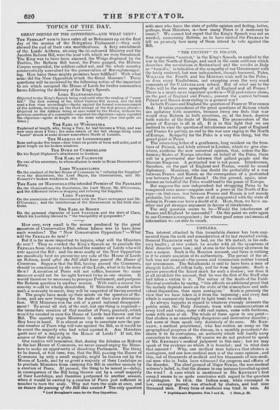"THE CONTEST" IN POLAND.
THE expression "contest," in the King's Speech, as applied to the war in the North of Europe, and used in the same sentence which describes the revolutions in Switzerland and the revolts in Italy as "tumults," is indicative of the sympathy of our Government with the lately enslaved, but now independent, though harassed, Poles. WILLIAM the Fourth and his Ministers wish well to the Poles ; so does every Englishman, not excepting even the very worst remnants of the CASTLEREAGH school. But of what use to the' Poles will be the mere sympathy of all England and all France ?. There is a much more important question—Will professions alone, on the part of England and France, prevent the contest between Poland and Russia from ending in a general war?
In both France and England the question of Peace or War comes first. It takes precedence of the great questions of Reform which. are agitating both countries, because every one feels that war would stop Reform in both countries, or, at the least, deprive' both nations of the fruits of Reform. The preservation of the peace of Europe is all in all. It is in this light that we are inclined to view the question of interference on the part of England. and France for put ting an end to the war now raging in the North ofEurope. Sympathy for the Poles is a very fine thing, but the grand point is Peace.
The interesting letter of a gentleman, long resident on the fron- tiers of Poland, and lately arrived in London, which we give else- where, confirms the now universal opinion, that, unless the Re-. forming States of Europe interfere on behalf of the Poles, there will be a protracted war between that gallant people and the Russian Emperor. A protracted war is not peace. Interference, therefore, on the part of England and France, would be sound diplomacy. Moreover, who can doubt the probability of a war between France and Russia as the consequence of a protratted war between Poland and Russia ? On this ground, again, inter ference on behalf of the Poles would tend to the peace of Europe.
But suppose the now independent but struggling Poles to be conquered once more—suppose such a peace in the North of Eu- rope—in that case, war between France and Russia is not merely probable, but certain. No one at all acquainted with the state of feeling in France can have a doubt of it. Here, then, we have an- other and yet stronger argument in favour of interference.
The only question seems to be—Would the interference of France and England be successful? On this point we refer again to our German correspondent ; for whose good sense and means of. information we are able to vouch.


























 Previous page
Previous page